In the constellation of human existence, the intersection of illness and the teachings of the Bahá’í Faith presents profound avenues for understanding cancer decision-making and contemplating the end of physical life. The Bahá’í approach emphasizes the sanctity of life, the notion of the soul, and the critical role of personal agency in health-related decisions.
The Bahá’í teachings provide a framework that can help individuals grapple with the complexities of a cancer diagnosis. Within these teachings, the very nature of life is viewed as a sacred trust. Health is not merely the absence of disease; it is the embodiment of a holistic state of well-being encompassing physical, spiritual, and emotional dimensions. This perspective fosters resilience and encourages individuals to approach medical challenges with a comprehensive understanding of their implications.
First and foremost, the notion of personal agency is paramount in Bahá’í ethics. Each individual is endowed with the capacity to make informed choices. This autonomy empowers patients to participate actively in their treatment plans, weighing options from holistic remedies to conventional medical treatments. The Bahá’í principle of consultation urges collective decision-making, underscoring that decisions regarding cancer care should not be made in isolation. Engaging with family members, medical professionals, and spiritual mentors can provide a more rounded perspective, illuminating both the medical paths and the spiritual implications tied to these choices.
Another essential consideration within Bahá’í teachings is the acknowledgment of suffering. While the experience of cancer often invokes fear and pain, Bahá’í writings illuminate suffering as a potential catalyst for spiritual growth and character development. This perspective can transform how patients perceive their journey through illness. Rather than being solely a narrative of loss, cancer can serve as an opportunity for profound introspection and a re-examination of values and priorities.
The Bahá’í Faith also addresses the end of physical life with a unique lens. Death is not perceived as the finality of existence but rather a transition to another state of being. (The term “fana,” meaning nonexistence or obliteration, juxtaposes with “baqa,” or existence in the spiritual realm.) This duality serves as a balm for those grappling with terminal diagnoses. Understanding death as a natural part of the continuum of existence diminishes fear and cultivates acceptance, allowing individuals the freedom to focus on the quality of their remaining time rather than solely on the countdown to an inevitable end.
Additionally, the process of dying is considered an opportunity for preparing oneself for the afterlife. Bahá’í teachings encourage individuals to cultivate virtues and engage in acts of service, thereby bolstering their spiritual preparedness. This idea reinforces the belief that one’s life on earth has implications beyond mere physical existence.
Guiding principles within Bahá’í texts emphasize the importance of both nurturing the self and serving humanity. Cancer patients may find solace and purpose in continuing to contribute to their communities or engaging in acts of kindness, even in the face of their own struggles. Community engagement becomes a profound source of strength, fostering connections that enrich not only the healer but also the community as a whole. In this manner, each individual’s journey can inspire collective upliftment, marking their cancer story with meaning, rather than resignation.
Cancer patients are encouraged to reflect upon their spirituality as a source of comfort and guidance. Utilization of prayer and meditation within Bahá’í practice can provide solace amidst the stresses of a medical journey. Engaging in these spiritual practices fosters a calmer mentality, allowing individuals to navigate their fears, anxieties, and uncertainties. This introspective process becomes an essential tool, aiding in the emotional management of diagnosis and treatment.
Moreover, the Bahá’í doctrine emphasizes the unity of humanity, extending compassion not only within immediate familial circles but also towards the broader community. Empathetic actions might include supporting fellow patients or raising awareness about cancer treatment options. Such engagements can facilitate a network of understanding and love, transforming the often isolating experience of illness into an avenue for connection and communal strength.
In terms of practical application, individuals facing cancer decisions might engage with Bahá’í teachings by participating in study circles focused on relevant texts. This engagement can provide profound insights into the intersection of faith and health, while simultaneously fostering community bonds. Furthermore, attending spiritual gatherings can illuminate paths of hope and resilience, reinforced by shared belief systems and experiences.
In light of these considerations, it is paramount for individuals diagnosed with cancer to approach decision-making with both a spirit of inquiry and an acknowledgment of their own divine potential. The confluence of personal agency, the sanctity of life, and the understanding of death as a transformative journey shapes an enlightening perspective that elevates the human experience. Ultimately, the essence of Bahá’í teachings offers a navigational compass through the complexities of illness, fostering a narrative rife with meaning, hope, and interconnectedness in the face of life’s intricate tapestry.
